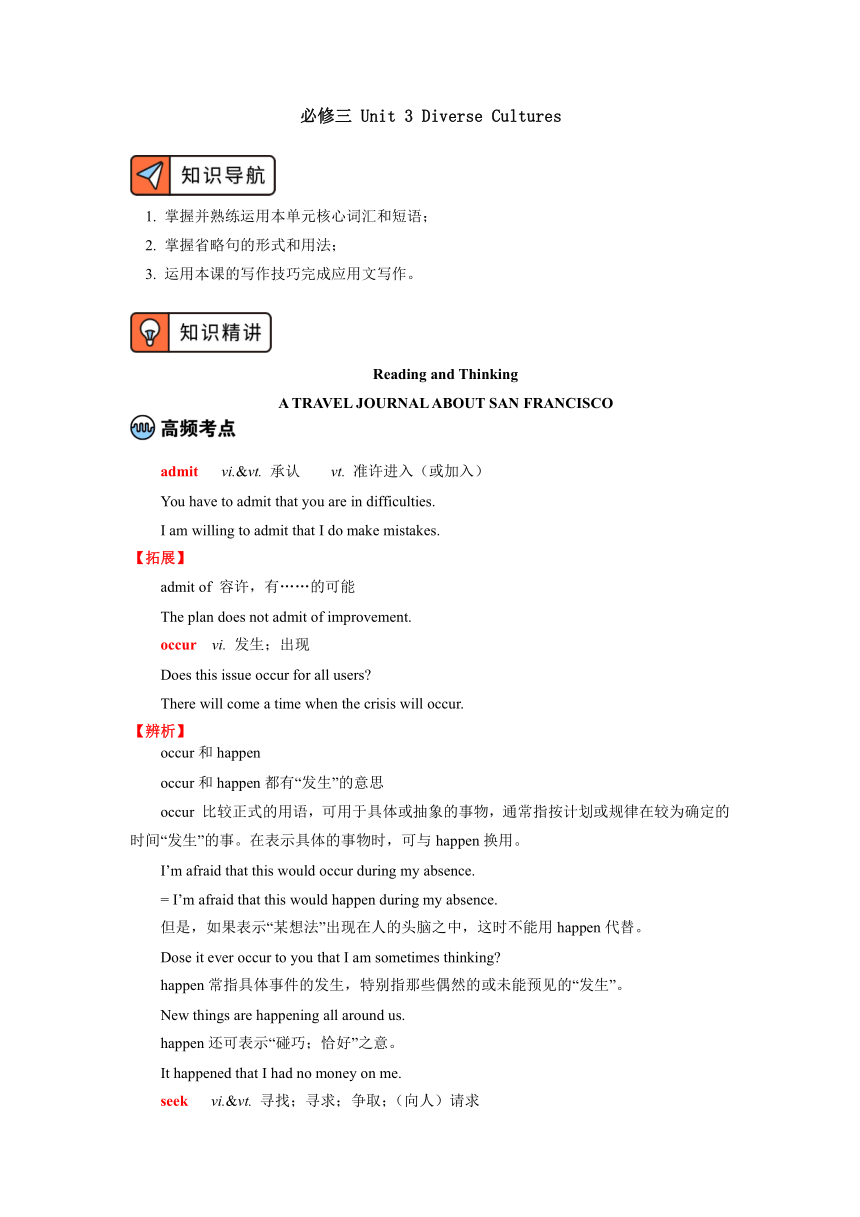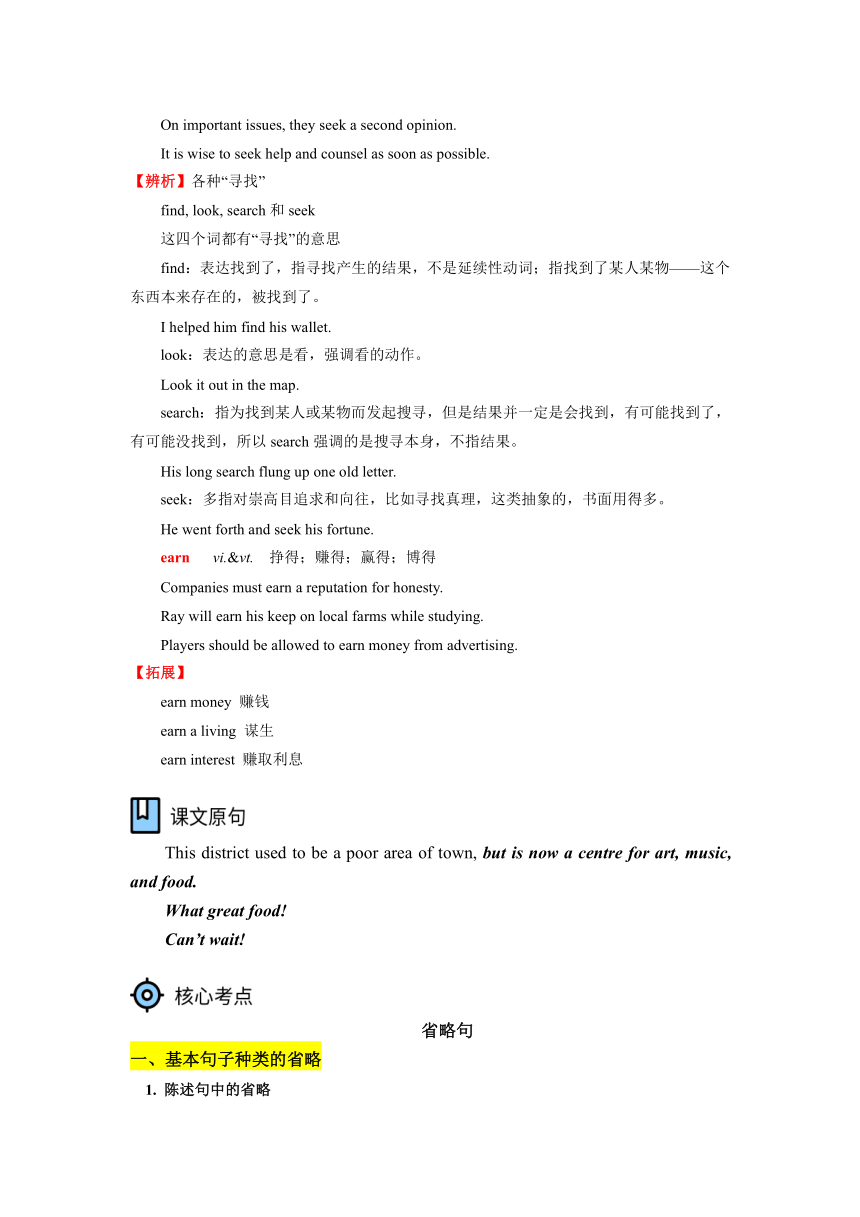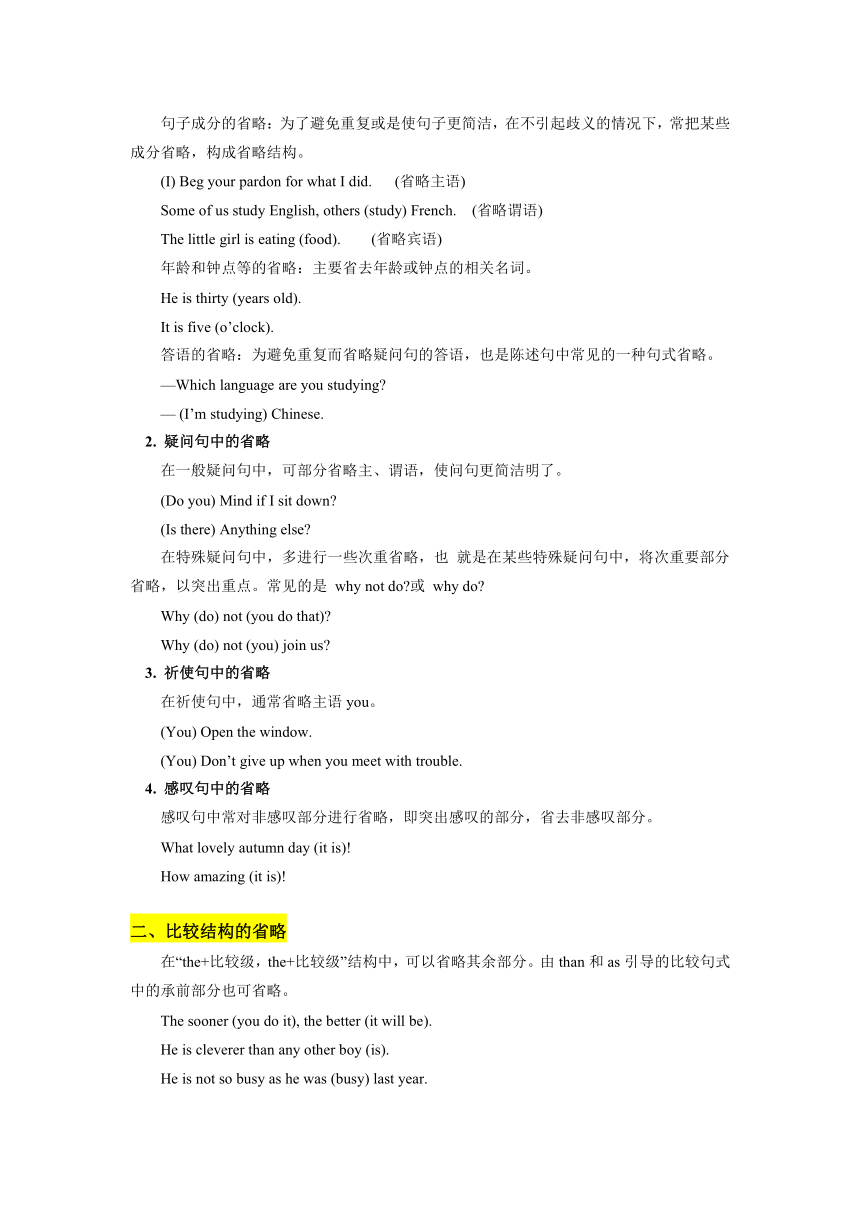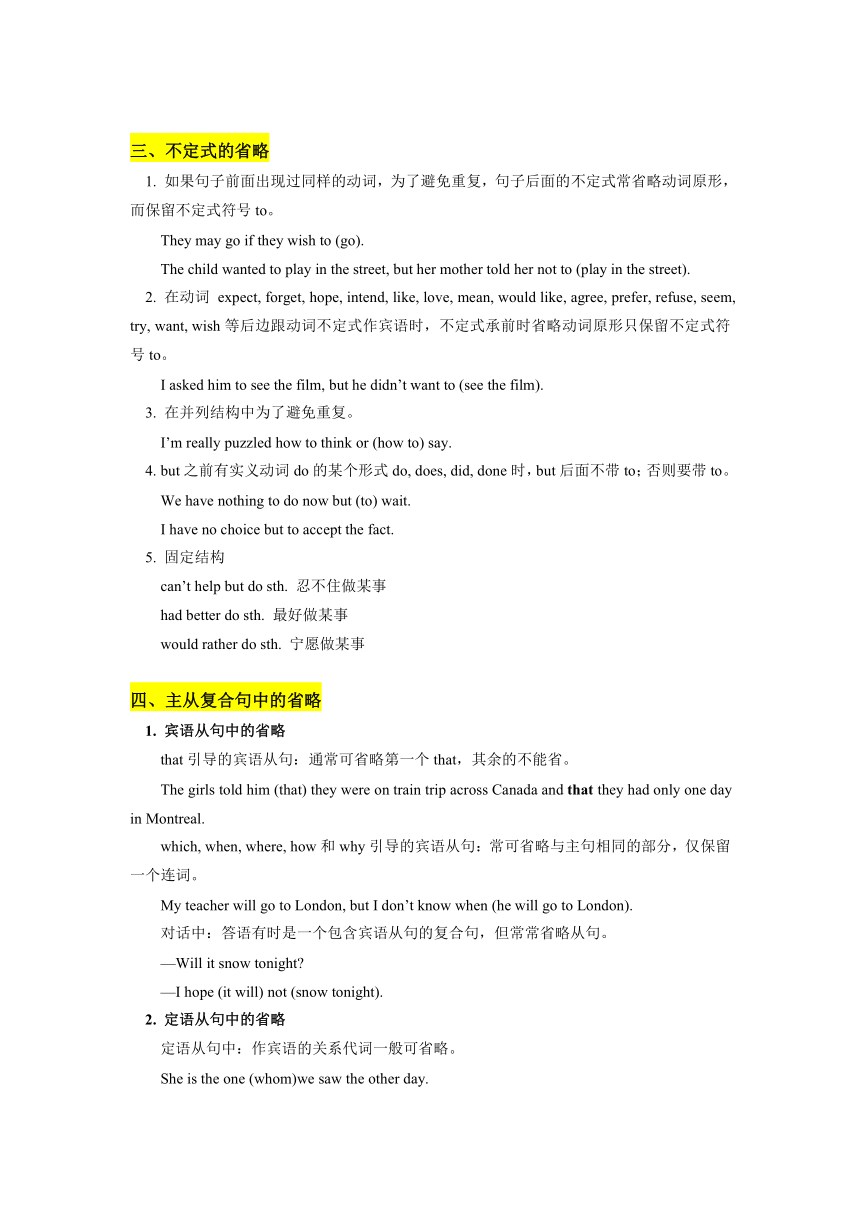高中英语人教版(2019)必修三 Unit 3 Diverse Cultures学案
文档属性
| 名称 | 高中英语人教版(2019)必修三 Unit 3 Diverse Cultures学案 |  | |
| 格式 | docx | ||
| 文件大小 | 73.3KB | ||
| 资源类型 | 教案 | ||
| 版本资源 | 人教版(2019) | ||
| 科目 | 英语 | ||
| 更新时间 | 2021-02-24 19:41:39 | ||
图片预览




文档简介
必修三 Unit 3 Diverse Cultures
1. 掌握并熟练运用本单元核心词汇和短语;
2. 掌握省略句的形式和用法;
3. 运用本课的写作技巧完成应用文写作。
Reading and Thinking
A TRAVEL JOURNAL ABOUT SAN FRANCISCO
admit vi.&vt. 承认 vt. 准许进入(或加入)
You have to admit that you are in difficulties.
I am willing to admit that I do make mistakes.
【拓展】
admit of 容许,有……的可能
The plan does not admit of improvement.
occur vi. 发生;出现
Does this issue occur for all users?
There will come a time when the crisis will occur.
【辨析】
occur和happen
occur和happen都有“发生”的意思
occur 比较正式的用语,可用于具体或抽象的事物,通常指按计划或规律在较为确定的时间“发生”的事。在表示具体的事物时,可与happen换用。
I’m afraid that this would occur during my absence.
= I’m afraid that this would happen during my absence.
但是,如果表示“某想法”出现在人的头脑之中,这时不能用happen代替。
Dose it ever occur to you that I am sometimes thinking?
happen常指具体事件的发生,特别指那些偶然的或未能预见的“发生”。
New things are happening all around us.
happen还可表示“碰巧;恰好”之意。
It happened that I had no money on me.
seek vi.&vt. 寻找;寻求;争取;(向人)请求
On important issues, they seek a second opinion.
It is wise to seek help and counsel as soon as possible.
【辨析】各种“寻找”
find, look, search和seek
这四个词都有“寻找”的意思
find:表达找到了,指寻找产生的结果,不是延续性动词;指找到了某人某物——这个东西本来存在的,被找到了。
I helped him find his wallet.
look:表达的意思是看,强调看的动作。
Look it out in the map.
search:指为找到某人或某物而发起搜寻,但是结果并一定是会找到,有可能找到了,有可能没找到,所以search强调的是搜寻本身,不指结果。
His long search flung up one old letter.
seek:多指对崇高目追求和向往,比如寻找真理,这类抽象的,书面用得多。
He went forth and seek his fortune.
earn vi.&vt. 挣得;赚得;赢得;博得
Companies must earn a reputation for honesty.
Ray will earn his keep on local farms while studying.
Players should be allowed to earn money from advertising.
【拓展】
earn money 赚钱
earn a living 谋生
earn interest 赚取利息
This district used to be a poor area of town, but is now a centre for art, music, and food.
What great food!
Can’t wait!
省略句
一、基本句子种类的省略
1. 陈述句中的省略
句子成分的省略:为了避免重复或是使句子更简洁,在不引起歧义的情况下,常把某些成分省略,构成省略结构。
(I) Beg your pardon for what I did. (省略主语)
Some of us study English, others (study) French. (省略谓语)
The little girl is eating (food). (省略宾语)
年龄和钟点等的省略:主要省去年龄或钟点的相关名词。
He is thirty (years old).
It is five (o’clock).
答语的省略:为避免重复而省略疑问句的答语,也是陈述句中常见的一种句式省略。
—Which language are you studying?
— (I’m studying) Chinese.
2. 疑问句中的省略
在一般疑问句中,可部分省略主、谓语,使问句更简洁明了。
(Do you) Mind if I sit down?
(Is there) Anything else?
在特殊疑问句中,多进行一些次重省略,也 就是在某些特殊疑问句中,将次重要部分省略,以突出重点。常见的是 why not do?或 why do?
Why (do) not (you do that)?
Why (do) not (you) join us?
3. 祈使句中的省略
在祈使句中,通常省略主语you。
(You) Open the window.
(You) Don’t give up when you meet with trouble.
4. 感叹句中的省略
感叹句中常对非感叹部分进行省略,即突出感叹的部分,省去非感叹部分。
What lovely autumn day (it is)!
How amazing (it is)!
二、比较结构的省略
在“the+比较级,the+比较级”结构中,可以省略其余部分。由than和as引导的比较句式中的承前部分也可省略。
The sooner (you do it), the better (it will be).
He is cleverer than any other boy (is).
He is not so busy as he was (busy) last year.
三、不定式的省略
1. 如果句子前面出现过同样的动词,为了避免重复,句子后面的不定式常省略动词原形,而保留不定式符号to。
They may go if they wish to (go).
The child wanted to play in the street, but her mother told her not to (play in the street).
2. 在动词 expect, forget, hope, intend, like, love, mean, would like, agree, prefer, refuse, seem, try, want, wish等后边跟动词不定式作宾语时,不定式承前时省略动词原形只保留不定式符号to。
I asked him to see the film, but he didn’t want to (see the film).
3. 在并列结构中为了避免重复。
I’m really puzzled how to think or (how to) say.
4. but之前有实义动词do的某个形式do, does, did, done时,but后面不带to;否则要带to。
We have nothing to do now but (to) wait.
I have no choice but to accept the fact.
5. 固定结构
can’t help but do sth. 忍不住做某事
had better do sth. 最好做某事
would rather do sth. 宁愿做某事
四、主从复合句中的省略
1. 宾语从句中的省略
that引导的宾语从句:通常可省略第一个that,其余的不能省。
The girls told him (that) they were on train trip across Canada and that they had only one day in Montreal.
which, when, where, how和why引导的宾语从句:常可省略与主句相同的部分,仅保留一个连词。
My teacher will go to London, but I don’t know when (he will go to London).
对话中:答语有时是一个包含宾语从句的复合句,但常常省略从句。
—Will it snow tonight?
—I hope (it will) not (snow tonight).
2. 定语从句中的省略
定语从句中:作宾语的关系代词一般可省略。
She is the one (whom)we saw the other day.
在非正式文体的定语从句中:关系代词as后面的主谓成分或助动词be可省略。
She gave the same answer as (she had given) before.
3. 状语从句中的省略
有些表示条件、时间、地点、方式或让步等的状语从句,如果谓语含有be动词,主语又和主句中的主语一致,或者主语是it,常把从句中的主语和be动词省略。
If (it is) so, you must go back and get it.
Look out for cars when (you are) crossing the street.
As (he was) a young man, he studied law and became lawyer.
在以than或as引导的状语从句中,一些成分常可省略或用do进行替代省略。
There is more salt in it than (there is) sugar (in it).
You’d like it as soon as (it is) possible.
if引导的非真实条件句中含有were, had, should时,可将if省略,并用倒装结构。
Were I you(=If were you), I wouldn’t go with him.
Had Thomas Edison, the great inventor stored his money (=If Thomas Edison, the great inventor had stored his money), he would have died a wealthy man.
1. — You haven’t lost the ticket, have you?
— _________. I know it’s not easy to get another one at the moment.
A. I hope not B. Yes, I have C. I hope so D. Yes, I’m afraid so
2. When _________ help, one often says “Thank you.” or “It’s kind of you.”
A. offering B. to offer C. to be offered D. offered
3. — How about putting some pictures into the report?
—___ A picture is worth a thousand words.
A. No way. B. Why not? C. All right? D. No matter.
4. — I was wondering if we could go skiing on the weekend.
— _______good.
A. Sound B. Sounded C. Sounding D. Sounds
5. We all know that, __________, the situation will get worse.
A. not if dealt carefully with B. if not carefully dealt with
C. if dealt not carefully with D. not if carefully dealt with
【答案与解析】
1. A 解析:用so,not或其它手段来省略上文或问句中的一部分或整个句义,是高考的常考项目。本题就是考查这一考点,根据句意,选A。
2. D 解析:本题是高考中常考的又一考点,在when,while,if,as if,though(或although),as,until,once,whether,unless,where等连词连接的状语从句中,常省略跟主句相同的主语和be动词。本题省去了“one is”。
3. B 解析:“why (not) do” 结构中, 不定式不带to,属于一种句型化的省略。
4. D 解析:“It/That sounds good/great/….”这样的答语中常省略主语。
5. B 解析:本题也考查了状语从句中省略“主语+be”的问题。
Reading for writing
WELCOME TO CHINATOWN!
settle vi.&vt. 定居;结束(争论);解决(纠纷)
He visited Paris and eventually settled there.
They agreed to try to settle their dispute by negotiation.
【拓展】
settle differences 解决分歧
settle a dispute 解决争端
settle things 解决事情
settle a lawsuit/suit 解决诉讼
settle a matter 把事情安排妥当
settle down 平息;停息
construction n. 建筑;建造;(句子、短语等的)结构
He’d already started construction on a hunting lodge.
A grammatical construction is a particular arrangement of words in a sentence, clause, or phrase.
【拓展】
adj.
constructive 建设性的;构造上的
adv.
constructively 建设性地
n.
construct 构想,概念
constructor建造者
vt.
construct 建造,构造;创立
material n. 材料;布料;素材 adj. 物质的;实际的
In my version of the story, I added some new material.
Please make a copy of this material.
The body is material but the soul is immaterial.
【拓展】
raw material 原料
teaching material 教学内容;教学资料
new material 新材料
building material 建筑材料
composite material 复合材料
construction material 建筑材料
reference material 参考资料;参考材料
suit vt. 适合;满足……需要;相配;合身 n. 西服;套装
She was dressed in a black woolen suit.
This kind of behavior does not suit a young woman.
【拓展】
adj.
suitable 适当的;相配的
suited 合适的
adv.
suitably 适当地;相配地;适宜地
n.
suiting 西装料;一身西服
【辨析】
adapt, suit, fit 这些动词均有“使适合,适应”之意。
adapt : 指人或物在原有情况下作某些改变以适应新的环境或不同的条件,强调改变的目的和重要性。
suit : 指适合要求,从而使人满意愉快。
fit : 含义广,指人或物适合或适应某一目的或用途。
主题写作——介绍一个城市
写作任务:
假设你的家乡是青岛,你负责接待一个来自英国的旅游团。请你写一篇100词左右的导游词,简要介绍一下你的家乡青岛。内容要点如下:
(1)位于山东省东部;
(2)以蓝色的大海、美丽的海滨而闻名,是避暑胜地;
(3)来自全世界成千上万的人每年夏天都到这里漫步、游泳、购物、观赏秀丽景色;
(4)近年来,该城市发生了巨大变化,对发展我国对外贸易起到重要作用,成为国际港口城市。
写作思路:
一审:确定写作体裁和主题
体裁:应用文——导游词
主题:介绍青岛
二定:确定时态和人称(与体裁和主题息息相关)
时态:一般现在时
人称:第二人称和第三人称
三明确
明确写作要点:青岛的位置→青岛的景色→青岛的地位
四分段(与写作要点息息相关)
结合写作要点,正文部分可分为四段。
素材整理:
(1)关键词语
welcome, introduce, introduction, delight, be famous, well-known for, tourist city, attract, attractive, attraction, visitor, natural beauty, be located in/on, climate, neither…nor, have a population of, scenery spot, history, historical, culture, be described as, description, develop, with the development of, take place, change
(2)翻译句子
①我很高兴能做你们的导游,有机会向你们简单介绍我们的城市。
(delighted, opportunity)
②青岛市位于山东省的东部,以其蔚蓝的大海和美丽的海滩而出名。
(be located, which)
③青岛是个避暑的好地方,来自全世界成千上万的人每年夏天都到这儿来。
(all over the world)
④你可以在海边走走,到海里去游泳或者到商店或市场去买东西。
(并列谓语动词)
⑤特别吸引人的是东方和西方风格混合的住宅和别墅建筑群。
(完全倒装)
⑥近年来青岛发生了巨大的变化,这对发展我国对外贸易起到了重要的作用。(take place,play a part in)
Keys: ① I’m very delighted to be your guide here and have this opportunity to give you a brief introduction of our city.
② The city of Qingdao is located in the east of Shandong Province, which is famous for its blue sea and beautiful beaches.
③ Qingdao is a wonderful place for summer holidays and tens of thousands of people from all over the world come to visit the city every summer.
④ You can walk along the beaches, go swimming in the sea, or do some shopping in the stores or at the market.
⑤ Especially attractive are the building groups of the Eastern-and-Western-style mixed houses and villas.
⑥ Great changes have taken place, has played an important part in the development of the foreign trade of our country.
将以上句子连成一篇语言流畅、用词准确、逻辑严谨的短文。
Ladies and gentlemen,
Welcome to Qingdao. I’m very delighted to be your guide here and have this opportunity to give you a brief introduction of our city.
The city of Qingdao is located in the east of Shandong Province, which is famous for its blue sea and beautiful beaches. Qingdao is a wonderful place for summer holidays and tens of thousands of people from all over the world come to visit the city every summer. You can walk along the beaches, go swimming in the sea, or do some shopping in the stores or at the market. Especially attractive are the building groups of the Eastern-and-Western-style mixed houses and villas.
Great changes have taken place in Qingdao in recent years, which has played an important part in the development of the foreign trade of our country. Its port is busy. Ships and vessels from all around the world arrive and leave every day.
To sum up, it has become an international port city.
1. 掌握并熟练运用本单元核心词汇和短语;
2. 掌握省略句的形式和用法;
3. 运用本课的写作技巧完成应用文写作。
Reading and Thinking
A TRAVEL JOURNAL ABOUT SAN FRANCISCO
admit vi.&vt. 承认 vt. 准许进入(或加入)
You have to admit that you are in difficulties.
I am willing to admit that I do make mistakes.
【拓展】
admit of 容许,有……的可能
The plan does not admit of improvement.
occur vi. 发生;出现
Does this issue occur for all users?
There will come a time when the crisis will occur.
【辨析】
occur和happen
occur和happen都有“发生”的意思
occur 比较正式的用语,可用于具体或抽象的事物,通常指按计划或规律在较为确定的时间“发生”的事。在表示具体的事物时,可与happen换用。
I’m afraid that this would occur during my absence.
= I’m afraid that this would happen during my absence.
但是,如果表示“某想法”出现在人的头脑之中,这时不能用happen代替。
Dose it ever occur to you that I am sometimes thinking?
happen常指具体事件的发生,特别指那些偶然的或未能预见的“发生”。
New things are happening all around us.
happen还可表示“碰巧;恰好”之意。
It happened that I had no money on me.
seek vi.&vt. 寻找;寻求;争取;(向人)请求
On important issues, they seek a second opinion.
It is wise to seek help and counsel as soon as possible.
【辨析】各种“寻找”
find, look, search和seek
这四个词都有“寻找”的意思
find:表达找到了,指寻找产生的结果,不是延续性动词;指找到了某人某物——这个东西本来存在的,被找到了。
I helped him find his wallet.
look:表达的意思是看,强调看的动作。
Look it out in the map.
search:指为找到某人或某物而发起搜寻,但是结果并一定是会找到,有可能找到了,有可能没找到,所以search强调的是搜寻本身,不指结果。
His long search flung up one old letter.
seek:多指对崇高目追求和向往,比如寻找真理,这类抽象的,书面用得多。
He went forth and seek his fortune.
earn vi.&vt. 挣得;赚得;赢得;博得
Companies must earn a reputation for honesty.
Ray will earn his keep on local farms while studying.
Players should be allowed to earn money from advertising.
【拓展】
earn money 赚钱
earn a living 谋生
earn interest 赚取利息
This district used to be a poor area of town, but is now a centre for art, music, and food.
What great food!
Can’t wait!
省略句
一、基本句子种类的省略
1. 陈述句中的省略
句子成分的省略:为了避免重复或是使句子更简洁,在不引起歧义的情况下,常把某些成分省略,构成省略结构。
(I) Beg your pardon for what I did. (省略主语)
Some of us study English, others (study) French. (省略谓语)
The little girl is eating (food). (省略宾语)
年龄和钟点等的省略:主要省去年龄或钟点的相关名词。
He is thirty (years old).
It is five (o’clock).
答语的省略:为避免重复而省略疑问句的答语,也是陈述句中常见的一种句式省略。
—Which language are you studying?
— (I’m studying) Chinese.
2. 疑问句中的省略
在一般疑问句中,可部分省略主、谓语,使问句更简洁明了。
(Do you) Mind if I sit down?
(Is there) Anything else?
在特殊疑问句中,多进行一些次重省略,也 就是在某些特殊疑问句中,将次重要部分省略,以突出重点。常见的是 why not do?或 why do?
Why (do) not (you do that)?
Why (do) not (you) join us?
3. 祈使句中的省略
在祈使句中,通常省略主语you。
(You) Open the window.
(You) Don’t give up when you meet with trouble.
4. 感叹句中的省略
感叹句中常对非感叹部分进行省略,即突出感叹的部分,省去非感叹部分。
What lovely autumn day (it is)!
How amazing (it is)!
二、比较结构的省略
在“the+比较级,the+比较级”结构中,可以省略其余部分。由than和as引导的比较句式中的承前部分也可省略。
The sooner (you do it), the better (it will be).
He is cleverer than any other boy (is).
He is not so busy as he was (busy) last year.
三、不定式的省略
1. 如果句子前面出现过同样的动词,为了避免重复,句子后面的不定式常省略动词原形,而保留不定式符号to。
They may go if they wish to (go).
The child wanted to play in the street, but her mother told her not to (play in the street).
2. 在动词 expect, forget, hope, intend, like, love, mean, would like, agree, prefer, refuse, seem, try, want, wish等后边跟动词不定式作宾语时,不定式承前时省略动词原形只保留不定式符号to。
I asked him to see the film, but he didn’t want to (see the film).
3. 在并列结构中为了避免重复。
I’m really puzzled how to think or (how to) say.
4. but之前有实义动词do的某个形式do, does, did, done时,but后面不带to;否则要带to。
We have nothing to do now but (to) wait.
I have no choice but to accept the fact.
5. 固定结构
can’t help but do sth. 忍不住做某事
had better do sth. 最好做某事
would rather do sth. 宁愿做某事
四、主从复合句中的省略
1. 宾语从句中的省略
that引导的宾语从句:通常可省略第一个that,其余的不能省。
The girls told him (that) they were on train trip across Canada and that they had only one day in Montreal.
which, when, where, how和why引导的宾语从句:常可省略与主句相同的部分,仅保留一个连词。
My teacher will go to London, but I don’t know when (he will go to London).
对话中:答语有时是一个包含宾语从句的复合句,但常常省略从句。
—Will it snow tonight?
—I hope (it will) not (snow tonight).
2. 定语从句中的省略
定语从句中:作宾语的关系代词一般可省略。
She is the one (whom)we saw the other day.
在非正式文体的定语从句中:关系代词as后面的主谓成分或助动词be可省略。
She gave the same answer as (she had given) before.
3. 状语从句中的省略
有些表示条件、时间、地点、方式或让步等的状语从句,如果谓语含有be动词,主语又和主句中的主语一致,或者主语是it,常把从句中的主语和be动词省略。
If (it is) so, you must go back and get it.
Look out for cars when (you are) crossing the street.
As (he was) a young man, he studied law and became lawyer.
在以than或as引导的状语从句中,一些成分常可省略或用do进行替代省略。
There is more salt in it than (there is) sugar (in it).
You’d like it as soon as (it is) possible.
if引导的非真实条件句中含有were, had, should时,可将if省略,并用倒装结构。
Were I you(=If were you), I wouldn’t go with him.
Had Thomas Edison, the great inventor stored his money (=If Thomas Edison, the great inventor had stored his money), he would have died a wealthy man.
1. — You haven’t lost the ticket, have you?
— _________. I know it’s not easy to get another one at the moment.
A. I hope not B. Yes, I have C. I hope so D. Yes, I’m afraid so
2. When _________ help, one often says “Thank you.” or “It’s kind of you.”
A. offering B. to offer C. to be offered D. offered
3. — How about putting some pictures into the report?
—___ A picture is worth a thousand words.
A. No way. B. Why not? C. All right? D. No matter.
4. — I was wondering if we could go skiing on the weekend.
— _______good.
A. Sound B. Sounded C. Sounding D. Sounds
5. We all know that, __________, the situation will get worse.
A. not if dealt carefully with B. if not carefully dealt with
C. if dealt not carefully with D. not if carefully dealt with
【答案与解析】
1. A 解析:用so,not或其它手段来省略上文或问句中的一部分或整个句义,是高考的常考项目。本题就是考查这一考点,根据句意,选A。
2. D 解析:本题是高考中常考的又一考点,在when,while,if,as if,though(或although),as,until,once,whether,unless,where等连词连接的状语从句中,常省略跟主句相同的主语和be动词。本题省去了“one is”。
3. B 解析:“why (not) do” 结构中, 不定式不带to,属于一种句型化的省略。
4. D 解析:“It/That sounds good/great/….”这样的答语中常省略主语。
5. B 解析:本题也考查了状语从句中省略“主语+be”的问题。
Reading for writing
WELCOME TO CHINATOWN!
settle vi.&vt. 定居;结束(争论);解决(纠纷)
He visited Paris and eventually settled there.
They agreed to try to settle their dispute by negotiation.
【拓展】
settle differences 解决分歧
settle a dispute 解决争端
settle things 解决事情
settle a lawsuit/suit 解决诉讼
settle a matter 把事情安排妥当
settle down 平息;停息
construction n. 建筑;建造;(句子、短语等的)结构
He’d already started construction on a hunting lodge.
A grammatical construction is a particular arrangement of words in a sentence, clause, or phrase.
【拓展】
adj.
constructive 建设性的;构造上的
adv.
constructively 建设性地
n.
construct 构想,概念
constructor建造者
vt.
construct 建造,构造;创立
material n. 材料;布料;素材 adj. 物质的;实际的
In my version of the story, I added some new material.
Please make a copy of this material.
The body is material but the soul is immaterial.
【拓展】
raw material 原料
teaching material 教学内容;教学资料
new material 新材料
building material 建筑材料
composite material 复合材料
construction material 建筑材料
reference material 参考资料;参考材料
suit vt. 适合;满足……需要;相配;合身 n. 西服;套装
She was dressed in a black woolen suit.
This kind of behavior does not suit a young woman.
【拓展】
adj.
suitable 适当的;相配的
suited 合适的
adv.
suitably 适当地;相配地;适宜地
n.
suiting 西装料;一身西服
【辨析】
adapt, suit, fit 这些动词均有“使适合,适应”之意。
adapt : 指人或物在原有情况下作某些改变以适应新的环境或不同的条件,强调改变的目的和重要性。
suit : 指适合要求,从而使人满意愉快。
fit : 含义广,指人或物适合或适应某一目的或用途。
主题写作——介绍一个城市
写作任务:
假设你的家乡是青岛,你负责接待一个来自英国的旅游团。请你写一篇100词左右的导游词,简要介绍一下你的家乡青岛。内容要点如下:
(1)位于山东省东部;
(2)以蓝色的大海、美丽的海滨而闻名,是避暑胜地;
(3)来自全世界成千上万的人每年夏天都到这里漫步、游泳、购物、观赏秀丽景色;
(4)近年来,该城市发生了巨大变化,对发展我国对外贸易起到重要作用,成为国际港口城市。
写作思路:
一审:确定写作体裁和主题
体裁:应用文——导游词
主题:介绍青岛
二定:确定时态和人称(与体裁和主题息息相关)
时态:一般现在时
人称:第二人称和第三人称
三明确
明确写作要点:青岛的位置→青岛的景色→青岛的地位
四分段(与写作要点息息相关)
结合写作要点,正文部分可分为四段。
素材整理:
(1)关键词语
welcome, introduce, introduction, delight, be famous, well-known for, tourist city, attract, attractive, attraction, visitor, natural beauty, be located in/on, climate, neither…nor, have a population of, scenery spot, history, historical, culture, be described as, description, develop, with the development of, take place, change
(2)翻译句子
①我很高兴能做你们的导游,有机会向你们简单介绍我们的城市。
(delighted, opportunity)
②青岛市位于山东省的东部,以其蔚蓝的大海和美丽的海滩而出名。
(be located, which)
③青岛是个避暑的好地方,来自全世界成千上万的人每年夏天都到这儿来。
(all over the world)
④你可以在海边走走,到海里去游泳或者到商店或市场去买东西。
(并列谓语动词)
⑤特别吸引人的是东方和西方风格混合的住宅和别墅建筑群。
(完全倒装)
⑥近年来青岛发生了巨大的变化,这对发展我国对外贸易起到了重要的作用。(take place,play a part in)
Keys: ① I’m very delighted to be your guide here and have this opportunity to give you a brief introduction of our city.
② The city of Qingdao is located in the east of Shandong Province, which is famous for its blue sea and beautiful beaches.
③ Qingdao is a wonderful place for summer holidays and tens of thousands of people from all over the world come to visit the city every summer.
④ You can walk along the beaches, go swimming in the sea, or do some shopping in the stores or at the market.
⑤ Especially attractive are the building groups of the Eastern-and-Western-style mixed houses and villas.
⑥ Great changes have taken place, has played an important part in the development of the foreign trade of our country.
将以上句子连成一篇语言流畅、用词准确、逻辑严谨的短文。
Ladies and gentlemen,
Welcome to Qingdao. I’m very delighted to be your guide here and have this opportunity to give you a brief introduction of our city.
The city of Qingdao is located in the east of Shandong Province, which is famous for its blue sea and beautiful beaches. Qingdao is a wonderful place for summer holidays and tens of thousands of people from all over the world come to visit the city every summer. You can walk along the beaches, go swimming in the sea, or do some shopping in the stores or at the market. Especially attractive are the building groups of the Eastern-and-Western-style mixed houses and villas.
Great changes have taken place in Qingdao in recent years, which has played an important part in the development of the foreign trade of our country. Its port is busy. Ships and vessels from all around the world arrive and leave every day.
To sum up, it has become an international port city.
